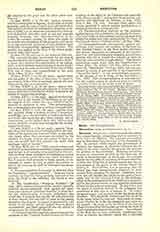

Executor, APOSTOLIC, a cleric who puts into execution a papal rescript, completing what is necessary in order that it be effective. The executor of a rescript may be discovered from the tenor of the document itself. In matters which regard the government of regulars, the executor of Apostolic Letters is the superior of the order, namely, the general, the procurator general, or the provincial. Rescripts containing favors are sometimes granted by the Holy See directly to the petitioners; in which case, the executor merely has the office of executing the favor asked for, without any obligation of judicial inquiry into the opportuneness of the grant, or the reasons alleged for seeking it. Nevertheless, if it is notorious that the favor has been surreptitiously obtained, he must abstain from executing the rescript. Rescripts, however, are not usually sent direct to the parties interested, but, in the external. forum, to the ordinary, either of the petitioners or of the territory in question, and in the internal forum, to any approved confessor chosen by the persons concerned. In this latter case the grant is remitted entirely to the judgment and conscience of him who is to execute it. He enjoys delegated power, and must act within the limits of his mandate. The Apostolic Letters must first of all be in his hands before he may act; from them he determines whether he is the one delegated, and what are his powers. He must verify the force of the reasons alleged for granting the request, as well as the truth of other statements found in the petition. As a delegate of the Holy See he may, ordinarily, subdelegate another to execute the rescript, unless this is expressly forbidden in the grant, or unless it is apparent that he is selected by reason of his knowledge or other personal qualities specially fitting him for the office. It is important to know whether an executor is chosen for his personal characteristics, or on account of his office: in the former case the delegation is personal, in the latter it is attached to the position, and passes on to the successor of the same office. A rescript given to the ordinary may likewise be executed by the vicar general. An executor must know the rules for interpreting rescripts, also, when they are rendered void, because surreptitiously obtained or for other cause. Rescripts emanating from the Sacred Penitentiaria are executed in the confessional, and are then destroyed by the confessor, as they treat of matters of conscience. When the rescript pertains to the external forum, a decree should be drawn up to the effect that all necessary formalities have been observed in its execution; these formalities should be specified. No fee is allowed for the execution of Apostolic Letters, lest the executor’s judgment be influenced thereby.
ANDREW B. MEEHAN

